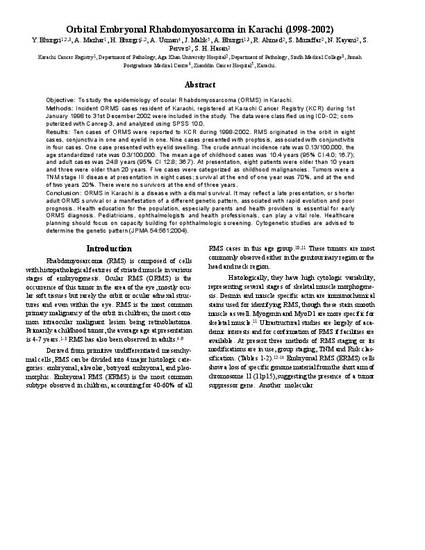
- Oncology and
- Pediatrics
Objective: To study the epidemiology of ocular Rhabdomyosarcoma (ORMS) in Karachi.
Methods: Incident ORMS cases resident of Karachi, registered at Karachi Cancer Registry (KCR) during 1st January 1998 to 31st December 2002 were included in the study. The data were classified using ICD-O2; computerized with Canreg-3, and analyzed using SPSS 10.0.
Results: Ten cases of ORMS were reported to KCR during 1998-2002. RMS originated in the orbit in eight cases, conjunctiva in one and eyelid in one. Nine cases presented with proptosis, associated with conjunctivitis in four cases. One case presented with eyelid swelling. The crude annual incidence rate was 0.13/100,000, the age standardized rate was 0.3/100,000. The mean age of childhood cases was 10.4 years (95% CI 4.0; 16.7); and adult cases was 24.8 years (95% CI 12.8; 36.7). At presentation, eight patients were older than 10 years and three were older than 20 years. Five cases were categorized as childhood malignancies. Tumors were a TNM stage III disease at presentation in eight cases; survival at the end of one year was 70%, and at the end of two years 20%. There were no survivors at the end of three years.
Conclusion: ORMS in Karachi is a disease with a dismal survival. It may reflect a late presentation, or shorter adult ORMS survival or a manifestation of a different genetic pattern, associated with rapid evolution and poor prognosis. Health education for the population, especially parents and health providers is essential for early ORMS diagnosis. Pediatricians, ophthalmologists and health professionals, can play a vital role. Healthcare planning should focus on capacity building for ophthalmologic screening. Cytogenetic studies are advised to determine the genetic pattern.
Available at: http://works.bepress.com/shahid_pervez/34/
